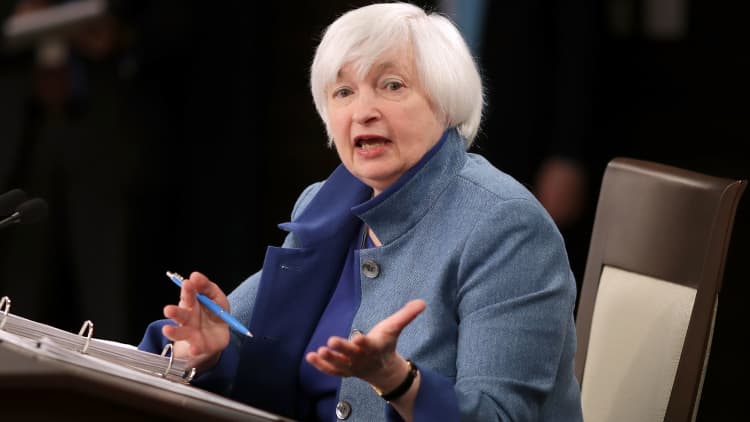
The Federal Reserve raised its 2017 prediction this week to three rate hikes instead of two, but analyst Peter Boockvar told CNBC on Thursday that the central bank is headed for a risky outcome no matter how many times it raises interest rates.
"Unfortunately, the Fed is in a no-win situation, because if they continue to go gradually in raising interest rates, even if they raise three times, if that's not enough relative to where inflation and growth is going, then the bond market's going to do it for them," Boockvar said on CNBC's "Squawk on the Street."
Bonds have been behaving unusually, on the rise since before the Fed's rate increase. If Boockvar's analysis plays out, bonds would continue to appreciate and eventually force the central bank's hand to hike.
"And if they get too aggressive in raising interest rates, which we need to get ... over with anyway, well, then they risk putting us into recession and tweets from Donald Trump," said Boockvar, chief market analyst at The Lindsey Group.
Boockvar said the stagnation the economy has been feeling stems from the Fed's "demand-side look at the world." In the face of a "supply-side election" where tax and regulatory policies will be the agents of change, growth prospects could look up, he said.
"I'm happy that hopefully growth can be driven more by the private sector and not monetary policy and academia," Boockvar said.

Some economists, like Point72 Asset Management's Dean Maki, have more optimism than Boockvar that the Fed will be forceful with its future rate raises.
"My view is that interest rates are going to go significantly higher here," Maki, who is Point72's chief economist, told "Squawk on the Street" in a separate interview.
Maki said that unusual economic conditions and expectations for fiscal stimulus by the new administration should cause the central bank to be more hawkish with hikes next year.
"If you step back, we're putting fiscal stimulus into an economy that's already at or close to full employment, and that's not usually the way things work," he said.
And, with the global economy simultaneously getting stronger after a period of deflationary shock, Maki said there's still room for the market to run.
"I do think that things that are tied to higher rates are going to do quite well," he said, referring to sectors like financials, which typically see their market values increase in response to rising rates.


